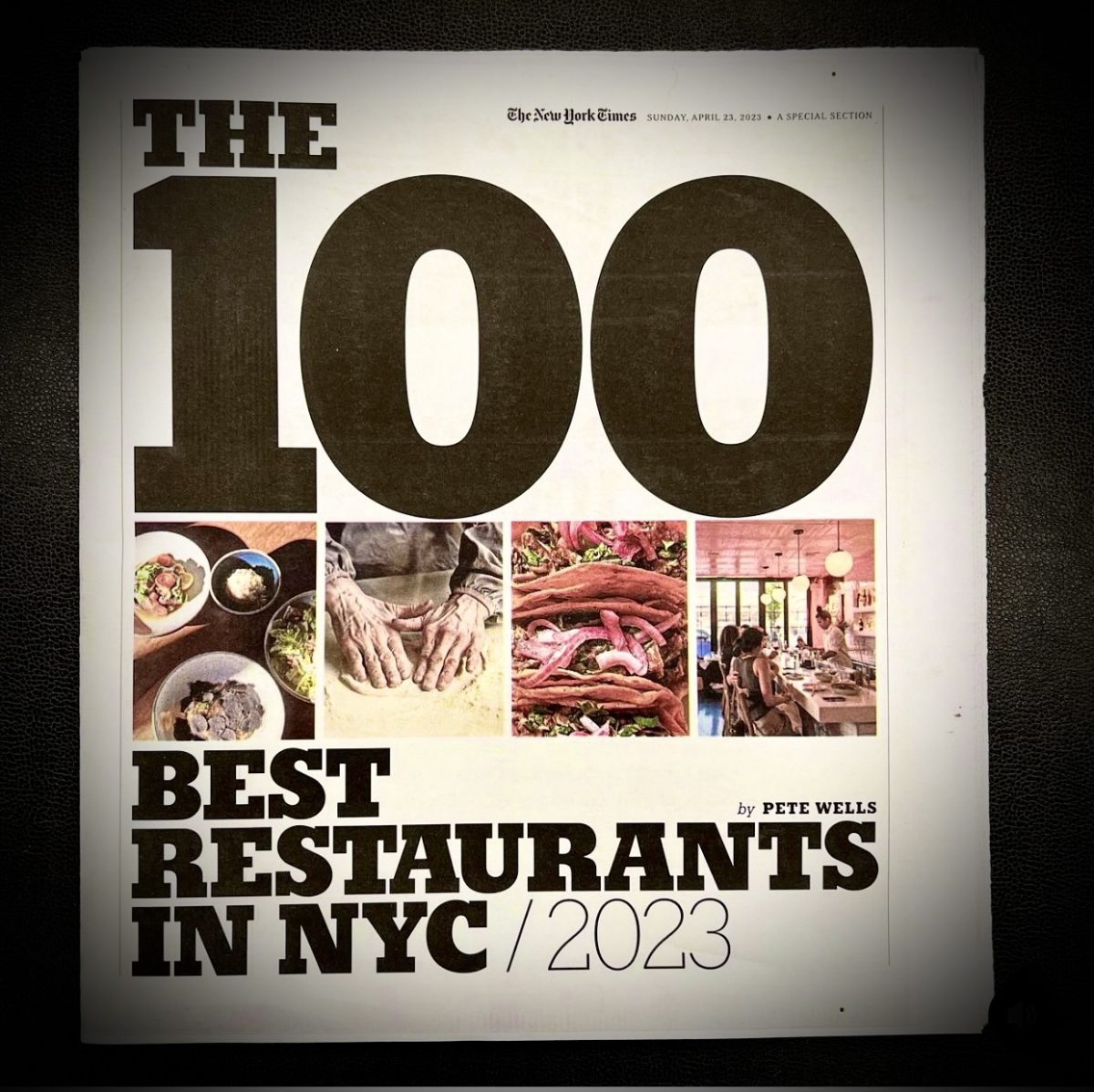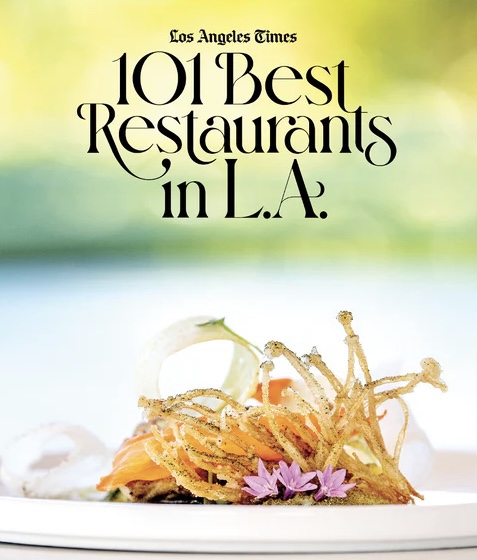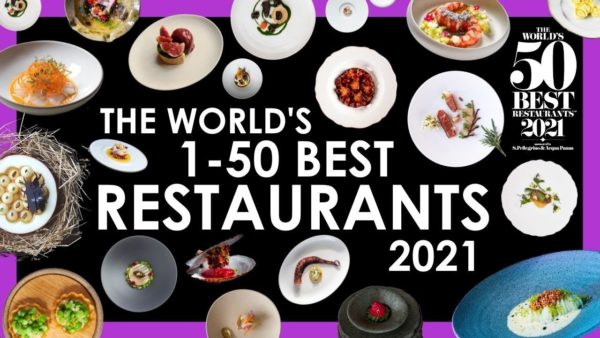When Danny Meyer’s book on the power of hospitality came out in October of 2006, it became the seminal text for restaurant industry insiders and entrepreneurs. Before Setting the Table, no one had given much serious thought to the notion that a restaurateur’s wisdom could provide a framework for success in other businesses. When Meyer opened Union Square Café, his first NYC restaurant, in 1985, his signature brand of “enlightened hospitality” became the gold standard by which many restaurateurs measure themselves.
Meyer’s impact on the restaurant industry has been profound, but adherence to his hospitality ideology has also contributed to a myopic service culture in fine dining that glorifies self-sacrifice. His company, Union Square Hospitality Group (USHG), spawned an entire generation of overachieving service industry professionals who’ve helped spread the gospel of enlightened hospitality far beyond his restaurants. To Meyer’s credit, his organization helped to legitimize restaurant work as a viable and attractive career path. However, when his apostles—former servers, bartenders, managers, and chefs—migrate elsewhere, they often parrot his teachings without giving proper thought to how these philosophies should evolve over time or adjust to different climates.
I thought about Meyer’s inheritance while reading Will Guidara’s new book, Unreasonable Hospitality—a well-intentioned but boilerplate regifting of Setting the Table published by Optimism Press last fall. Guidara openly acknowledges the debt he owes to Meyer for helping shape his own hospitality purview. He apprenticed under Meyer early in his career at various USHG venues (most notably Eleven Madison Park while Meyer still owned it). Many consider Guidara to be Meyer’s prodigal son and heir apparent.
The conceit of Guidara’s book doesn’t stray too far from Setting the Table. Unreasonable Hospitality implies a relentless pursuit of exceeding guests’ expectations, with a fanatical desire to go above and beyond even the highest standards of what constitutes great service. The book cleverly re-arranges the table setting from Setting the Table without compromising Meyer’s philosophies. Guidara presents a more rigorous, less reasonable, vision for hospitality excellence with the bravado of a self-proclaimed perfectionist. Spoiler: The secret sauce is never being satisfied.
It’s impossible to dissect the inherent flaws in what I call hospitality evangelism (the preachy kind) without acknowledging that, as its most visible gurus, Guidara and Meyer have largely built their careers catering to a privileged class of people. Not to detract from their achievements, but they’ve cornered the market for hospitality ideology mainly through their commitment to showering privileges on the privileged.
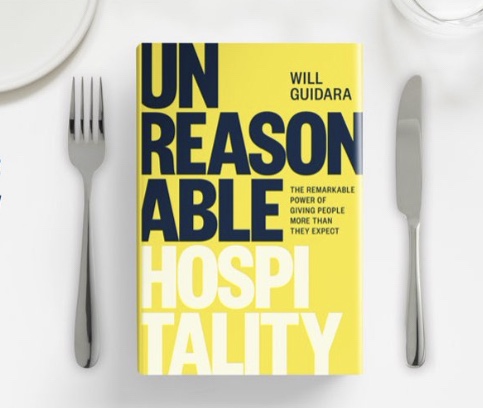
In Unreasonable Hospitality, Guidara describes a scenario involving a family from Spain spending their last night in NYC dining at EMP with two young children who are awestruck when it begins snowing outside during their meal. The children, who’ve never seen snow before, are fascinated. Guidara dispatches a “dreamweaver” (a staff member whose sole responsibility is helping execute unreasonably hospitable moments) to buy sleds for the kids and arranges for a limousine to chauffeur the family to Central Park after dinner so the kids can enjoy the snow up close. The gesture is touching, but I couldn’t help thinking about the fact that these affluent guests—dining at one of the most expensive restaurants in the world—had likely just spent over $2,000 on one meal, more than most families spend in a month on groceries.
Guidara insists that these “unreasonable” gestures need not be so grandiose. He surprises one table of four gastrotourists with a street cart hot dog cut into bite-sized pieces after overhearing them lament missing out on that part of their NYC culinary tour. But the impact of this humble gesture is heightened because of the stark contrast of a “dirty water dog” against the backdrop of a tweezered tasting menu. It’s patronizing for Guidara to behave as though a $2 hot dog can make everyone a hospitality hero.
Whether intended or not, the unicorn scenarios in Guidara’s book perpetuate a mythology around hospitality that feels untethered from reality. Guidara appears to live in a Steve Jobs-esque reality distortion field at EMP—a bubble that reminds me of Willy Wonka’s Chocolate Factory. Inside the restaurant, Guidara keeps all his Oompa Loompas dancing in unison to maintain the façade that everyone’s dreams are coming true. But just because the Oompa Loompas are all dancing and smiling doesn’t mean they all love their jobs or subscribe to Wonka’s mission. (A cynical reading would suggest that the Oompa Loompas are actually imprisoned by Wonka, but I digress.)
Guidara ignores how subordinates can become alienated when management laments losses more than it celebrates wins. “Praise is affirmation,” Guidara writes, “but criticism is an investment.” The subjects of his criticism are expected to withstand the constant headwinds resulting from his relentless pursuit of hospitality nirvana. Only in recent years have restaurant industry leaders become more sensitive to the toll that daily self-sacrifice takes on workers. Particularly in a post-pandemic world, it’s impossible to improve mental health in the service industry without rejecting the more dogmatic aspects of unreasonable hospitality ideology like Guidara’s.
At its core, Unreasonable Hospitality is a book about leadership. But unfortunately, it’s weighed down by superficial anecdotes about awards and accolades that depict Guidara as a restaurateur who is distracted by his quest to make EMP the best restaurant in the world. In his eyes, every prestigious award bestowed upon EMP—like inclusion on the World’s 50 Best Restaurants List—serves to validate his approach. But taking home trophies from highly politicized culinary pageants doesn’t feel like compelling evidence for the potency of his ideology.
It’s impossible to read Unreasonable Hospitality without wondering how many hard-working employees have felt oppressed by Guidara’s austere management style or how many well-intentioned people were exiled because they weren’t sufficiently devoted to his “unreasonable” habits. He assures us that his staff at EMP largely bought into his vision during his tenure, but only someone who’s never worked in a restaurant would believe it. The truth is that hospitality orthodoxy like Guidara’s can be outright hostile to those who refuse to drink the Kool-Aid. The quest for purity often leads to unhealthy competition among the staff, much the same way it does in educational environments populated by overachievers.
Among the many unreasonable extracurricular activities that EMP employees were expected to engage in under Guidara’s reign: eavesdropping on tables’ conversations to concoct unexpected surprises, Google-stalking photos of customers in advance so they can be identified by name without introducing themselves, and feeding parking meters on the street for guests while they dine. As a former server I can attest that it is certainly not reasonable to indenture staff to frivolous side hustles that encroach upon their ability to perform primary tasks.
Guidara admits that his dogmatic approach can come across cultish, but he insists that Unreasonable Hospitality isn’t a cult. “I have since come to realize,” he writes, “that a ‘cult’ is what people who work for companies that haven’t invested enough in their cultures tend to call the companies that have.” A closer look, however, suggests that it checks many of the boxes: a rigid belief system by which followers are expected to loyally abide, a hierarchy that prioritizes conformity, and a charismatic leader with a singular vision of how an insular community should function. As with cults, non-believers are ostracized. Guidara insists that he encourages staff to be themselves at work, but he only empowers them to be the version of themselves that he needs them to be for the restaurant.
In one passage, he describes transferring EMP staff over to his new restaurant project at the Nomad Hotel to serve as mentors for his new hires. “I thought of those transplants from EMP as sourdough starter,” Guidara writes, “not only would we have the benefit of their impeccable technical training, but they’d seed the new spot with our culture.” It’s revealing that he characterizes the staff’s purpose as being a simple vessel for transmitting hospitality culture and growing it like yeast, a brainless organism that spreads mindlessly. For someone who opines so reverentially about human resources, the analogy is reductive and dehumanizing.
It’s hard not to admire Guidara’s reckless optimism, though. “Hospitality is a selfish pleasure,” he writes, “It feels great to make other people feel good.” Of course, it does. But when guests’ expectations swell out of proportion—which happens quite often in elite restaurants—the onus is usually on the staff to fill in the gaps. Being a minion for leaders like Guidara often requires having to “turn people around” or “kill them with kindness” when they’re unhappy or underwhelmed. Pleasing unpleasant guests is viewed as a challenge by hospitality evangelists like Guidara, but it can be fraught, and, in environments with rigid culture like EMP, staff often goes to great lengths to satisfy people that don’t deserve or appreciate it.
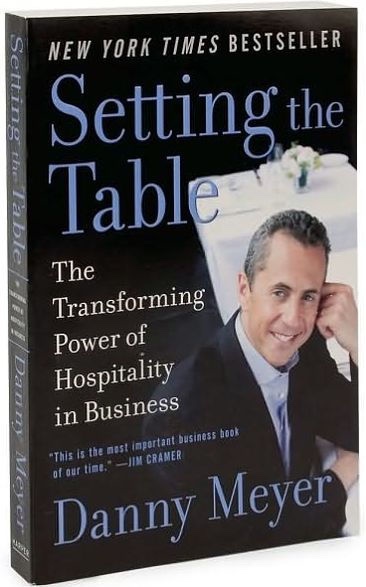
To account for this, Guidara quotes from the Book of Danny: “Make the charitable assumption,” a healthy reminder from Setting the Table that staff should assume guests’ best intentions whenever possible. Meyer and Guidara both agree that charitable assumptions don’t apply to cases where guests become belligerent or abusive. But in a restaurant setting, disrespectful or abusive guests are often skilled at concealing their nastiness. I’ve worked in countless restaurants that tolerated intolerable regulars, no matter how much grief they repeatedly caused the staff. Most managers would prefer servers to take it on the chin rather than confront an ungrateful or ornery guest. As restaurant workers, we never have the luxury of expecting guests to make charitable assumptions about us. I suspect that neither Meyer nor Guidara would ever dare burden their guests with that expectation either.
Guidara certainly isn’t the first person to codify principles around a business ideology and sell it as universal to other industries. Many entrepreneurs have built massive fortunes peddling manufactured optimism and obsessive work ethics—like Anthony Robbins, Gary Vaynerchuk, Joel Osteen, and Simon Sinek (Guidara’s publisher). It’s worth nothing that, at least in the mainstream, marketing self-empowerment schemes and big-dick-energy manifestos on positive thinking has been primarily a white male pursuit. There’s inherent privilege in Guidara presenting himself as the purveyor of the highest hospitality ideals when his world view has been largely shaped by making affluent people feel like the 1% of the 1%.
It’s possible to respect Guidara’s approach and his accomplishments without putting his ideology on a pedestal. The service industry, still reeling from the corrosive effects of the pandemic, can’t afford to glorify a pie-in-the-sky mentality about hospitality right now. There is no shame in cultivating more pragmatic models that work for us as much as they work for our guests.
I’ve argued before that continuing to define hospitality excellence according to the white male gaze and lionizing restaurateurs who are cut from the same white tablecloth only reinforces the industry’s diversity problems. By canonizing these white male figures, we exclude competing visions about hospitality excellence from marginalized communities and communities of color. When will influential publishers deliver a book that celebrates hospitality culture in Black or brown communities? Iconic restaurants like Sylvia’s in Harlem and Dooky Chase’s in New Orleans have had a much more profound impact on American culture than any Danny Meyer or Will Guidara restaurant ever will, but you won’t find any mainstream books that celebrate the unique style of hospitality found in them.
We deserve a new, more diverse and compassionate framework around hospitality that gives restaurant workers agency—that gives voice to the voiceless and expects guests to reciprocate the generosity they’re shown. Although it isn’t to blame in every case, hospitality orthodoxy fosters toxic environments where dysfunction has historically festered. Abuse, harassment, violence, and misogyny flourish in oppressive workplaces where perfectionism suffocates individuality and compassion. We can’t fix the cultural problems endemic to restaurants without reining in the zealots who subject their workers to unreasonable expectations.
“Start with what you want to achieve, instead of limiting yourself to what’s realistic or sustainable,” Guidara writes defiantly, “or as I like to say, don’t ruin a story with the facts.” I’m quite certain that Guidara would not like his book to be ruined by the fact that his utopian vision of hospitality has hidden costs. In its purest form, unreasonable hospitality can only exist when it comes at the expense of those who administer it. It’s incumbent on those people to be convinced that the self-sacrifice benefits them. But whether we believe that there’s salvation in serving others or not, ultimately, instead of canonizing overzealous manifestos like Setting the Table and Unreasonable Hospitality, the restaurant industry should embrace new paradigms that prioritize compassion and empower staff, where unreasonable expectations aren’t necessary to succeed.


